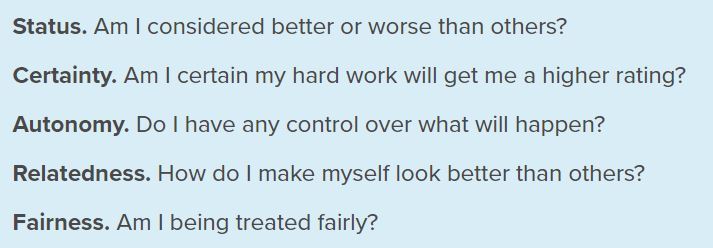Behind every great team is a great manager or business owner who is keeping everything moving along. But, how? How do you keep staff on track, manage time efficiently, motivate lazy employees, avoid a toxic work environment, and keep great employees? You have to give feedback to the members of your team. That’s why businesses give a performance review to each of their team members.
The Traditional Model for the Performance Review
Traditionally, managers completed employee performance reviews once a year. A manager assessed the work done over the previous year. Then, the manager would inform the employee whether or not their work had met company standards. Often times, staff received a score based on performance over the previous year and were ranked among their peers. Then, they’d receive an offer for a promotion or a raise based on their score.
Some businesses took this a little too far. Instead of only rewarding the top performers, they were also trying to separate the wheat from the chaff by firing the bottom ranking employees, year after year. Former CEO of GE, Jack Welsh, employed this method. The system was referred to often as “Rank and Yank.” The bottom 10% of employees were fired annually for twenty years with this system in place.
We’d Never do That!
At Apollo Answering Service, we don’t do a traditional annual performance review. In fact, we think that the traditional, annual performance review is an outdated way of managing employees and ultimately, a mistake for your business. But we aren’t the only ones.
Are Performance Reviews Dead?
We think so. Though GE had been known for their rank and yank system, they completely pulled the plug (pun not intended) on performance reviews not too long ago. No more ranking, no more yanking. But why?
Performance Reviews are Often Unrelated to the Work
Annual performance reviews are a dated tradition that goes back to the industrial revolution. Back when labor was manual. It was apparent back then when a laborer was or was not living up to the standard of his peers. When a manual worker’s work is gauged, you can see: did they make as many of your product as their peers, as fast as their peers? Simple.
Performance is much easier to evaluate on this traditional model with manual work. But work has become more collaborative and more knowledge based. Knowledge work is a little different; it’s not as easy to measure. You can’t boil thought work down the same way because you don’t consistently have the same end product nor do you consistently go through the same series of steps. You’re often paying for your employees’ innovations and ideas, not their task efficiency.
You can’t quantify ideas.
Managers don’t like Annual Performance Reviews
We’d like to think that it’s only the poor performing employees that don’t like performance reviews. But face it, managers don’t like them either. If an annual employee performance review is necessary, there’s going to be an uncomfortable conversation about the work that the employee has been doing. The formality of the conversation only makes it more stressful for both parties.

Image via Flickr
When a manager works closely with someone, they should have a pretty good relationship with them. They know if the person has a family and many financial obligations. When they’re tasked with giving a review that dictates whether or not that person will get a raise, they may take this information into consideration. Instead of giving a direct and honest review that could better the company, instead they could choose to give a more favorable review. No one wants to be the “bad guy” and threaten another person’s salary.
Many managers dislike giving out performance reviews so much that they avoid it entirely. They often are months overdue. In cases where employee raises are tied to a performance review, this is especially problematic. When an employee isn’t getting their raise based on their manager’s inaction, they feel undervalued and unmotivated to perform.
A Performance Review isn’t Easy to do
Not all managers are good at delving out report cards, either. That doesn’t make them bad managers. It’s an art to be able to give constructive criticism without provoking a defensive response. No one wants to hear bad news or negative opinions of the efforts they’ve put in, so it’s a very delicate process.

Photo by rawpixel.com from Pexels
In addition, performance reviews that use a scoring or grading system are often confusing and difficult to get everyone on the same page. For example, Texas Roadhouse once had annual performance review that used a 5-point rating scale. Seems easy enough, yet managers at the national chain couldn’t agree whether a score of a three was a positive review or a negative average. Instead of changing the rating scale to one with an even set of numbers, he followed the advice of the book Get Rid of the Performance Review! by Samuel A. Culbert. This resulted in a new plan that focused on an employee’s future improvements rather than past shortcomings.
Employees don’t like Annual Performance Reviews
Of course they don’t, right? Everyone doesn’t need to love everything about their job, right? Of course not. But the psychology behind performance reviews shows that the act of ranking employees is stressful in such a way that is debilitating to their productivity and is ultimately demotivating. That’s the last thing you want, right?
The Psychology Behind Why Employees Hate Performance Reviews
The process is registered in your brain as a threat whether you’re the one dishing out grades or grading people. According to Kim Ruyle, a talent management consultant, your brain immediately goes to thoughts such as, “Am I in trouble?” and “Why don’t they like me?” These thoughts lead to feelings of anxiety, which turns their focus to fear and humiliation. It also leads their brain to turn on the acute stress response, otherwise known as ‘fight or flight’.
Fight or Flight

Image via Flickr
Fight or flight refers to the choices that our ancient ancestors faced when faced with danger. When people generally allude to fight or flight, they often compare it to a predator chasing you. If a bear or wolf is approaching threateningly, you can either fight the creature off or you can flee the scene. The average person isn’t running into bears or wolves on a day-today basis, but these ancient parts of our brain are still used often.
That’s because bears and wolves weren’t the only threat to humans in ancient times. Let’s face it, if humans relied only on their agility or fighting abilities, we’d have been wiped out faster than you can say “Grizzly Bear.” People have used their minds, tools, and most importantly, their social network or “tribe” for survival since we’ve walked on two feet. Being alone would quickly end in death if a predator or enemy tribe approached. As a result, these fight or flight parts of our brain are ignited in modern times primarily as a result of social interactions. Instead of running from bears, we’re relying on acceptance into a social group for safety.
Fixed vs Growth Mindset
Research also shows that rankings foster a fixed mindset. If you’re unfamiliar with the term, it hails from Dr. Carol Dwek‘s findings on the psychology of success. Ultimately, what Dwek found is that people either believe that abilities, like intelligence or talent, either come naturally or they must be developed. Those that believe that practice can lead to mastery are said to have a growth mindset, and are more likely to achieve their goals through hard work and perseverance. Those that believe that an ability is inherent are more likely to feel “stuck,” thus taking less effort toward achieving a goal.
When you spend time documenting intelligence or talents, you’re not focusing on developing those abilities. The employee will then think that they “just don’t measure up” instead of seeking out ways to become stronger in a certain field.
The Tole on Emotions
Generally, people want to keep emotions out of the workplace. But, the process of ranking makes people all kinds of emotional. According to David Rock, author of “Your Brain at Work,” there are five factors that have a serious effect on human emotion.

Screenshot via shrm.org
Employee performance reviews, in fact, effect all of these emotional triggers.
Annual Performance Reviews are Ineffective
You won’t get different results sooner
If you’re only committing to reviewing your employees at the end of the year, how often do you think you’re going to have impactful change throughout your organization? Once a year. With the rate in which businesses, the economy, the WORLD, changes, you don’t want to wait that long to let staff know about their performance. The market and technology are constantly changing. That kind of waiting can cost you in clients, customers, time, money–even your business itself.
You might not get different results at all
If you’re only touching base once a year, when are you following up with the suggestions that were made? Next year?
The traditional annual performance review model does not involve an ongoing check-in process that encourages growth. This practice of grading people based on prior performance and firing or promoting based on that grade may make the low performers feel disappointed in themselves for the short term. But without steps for low performers to succeed, they’ll just go right back to business as usual.
Or, you’ll end up with less innovation

Screenshot via NPR.org
If employees are being graded based on successful performance, they’ll internalize that. That plays out in only wanting to commit to the status quo and doing that well, rather than risking a failure through a cutting edge idea. Unfortunately, creating this type of business environment could set your business behind your competitors and risk the longevity of your business.
What should you do instead?
Put simply, a healthy employee/manager relationship should have plenty of conversations that would void an annual performance review.
Why?
Because management isn’t about getting a higher salary than the rest of the team and delving out orders. Your role as a manager is an important one in guiding each member of your team to do their best work. A good manager guides the company to a better place through each individual they manage. And they do this through having an ongoing relationship and outstanding internal communication.
An Ongoing Relationship is Crucial
Instead of the annual performance review, the best thing to do is have frequent conversations with your team members about their performance, good and bad. The more feedback, the better. After all, how can you expect your team to live up to your expectations if the expectations are unclear?
When you have frequent conversations with your employees, there isn’t the same pressure of an annual performance review. It turns into a regular conversation and anxiety melts away. Your employees are then able to open up and discuss work-related issues without the heightened emotions associated with annual employee performance reviews.
Other Options
Feedback without evaluation
Feedback is integral to improvement. However, feedback that is framed as a discussion is far less threatening.
Frequent one-on-one conversations, as mentioned prior, are the way to go. This is exceedingly more important with younger workers. Millenials are more eager for feedback than older generations. They’re focused on excelling and prefer to get negative and positive feedback frequently, so that they can know whether or not they are meeting the mark.
Performance Improvement Plans
Annual employee performance reviews are focused on how the team member is meeting or exceeding company standards. But how is the company meeting the needs of the employee? Performance improvement plans take the focus off of employee shortcomings and onto company tools and culture that encourages growth and innovation.
Quarterly and Annual Planning Sessions
This is where those check-ins on progress would come to play. A vague plan is one thing, but a SMART goal is something that gets done. When you create plans for employee performance improvement, you should have a set time frame for checking back in on that plan.
Apply this to your small business
Are you using antiquated methods of rating employees and deciding who to fire or write up? Rethink your strategy that places the focus on employee improvement.


